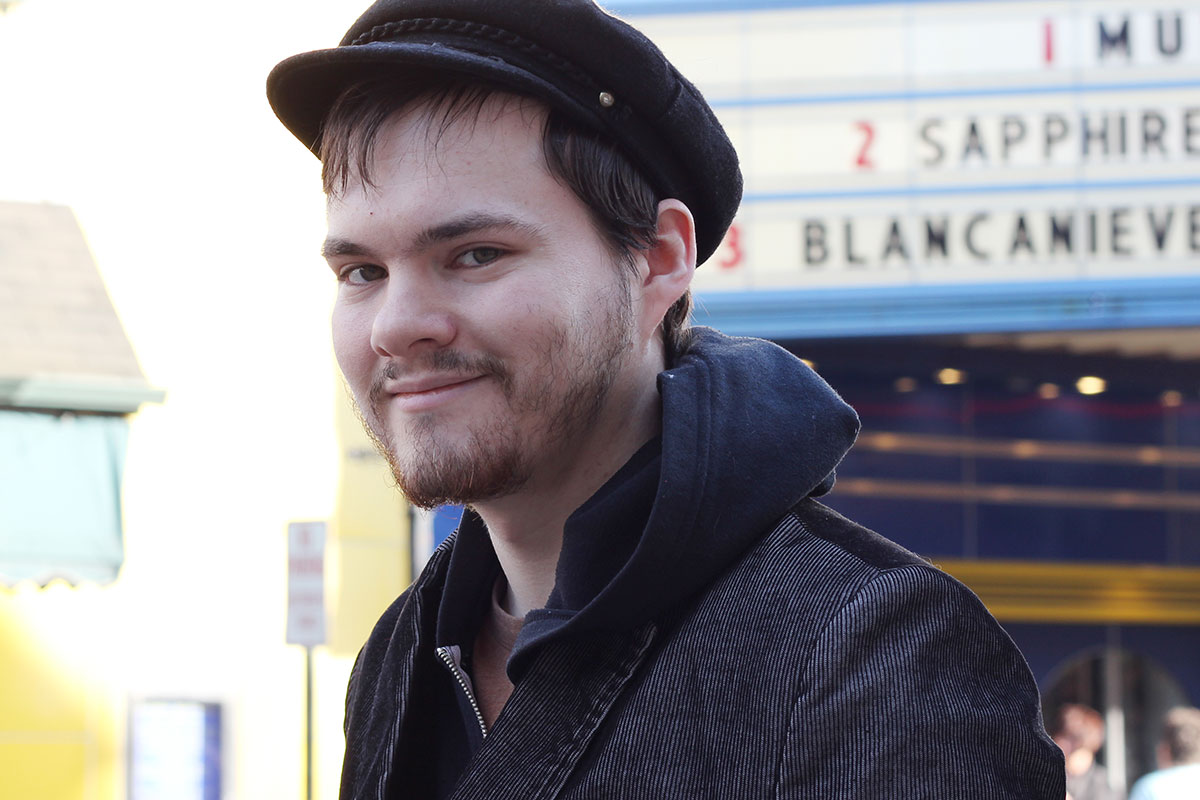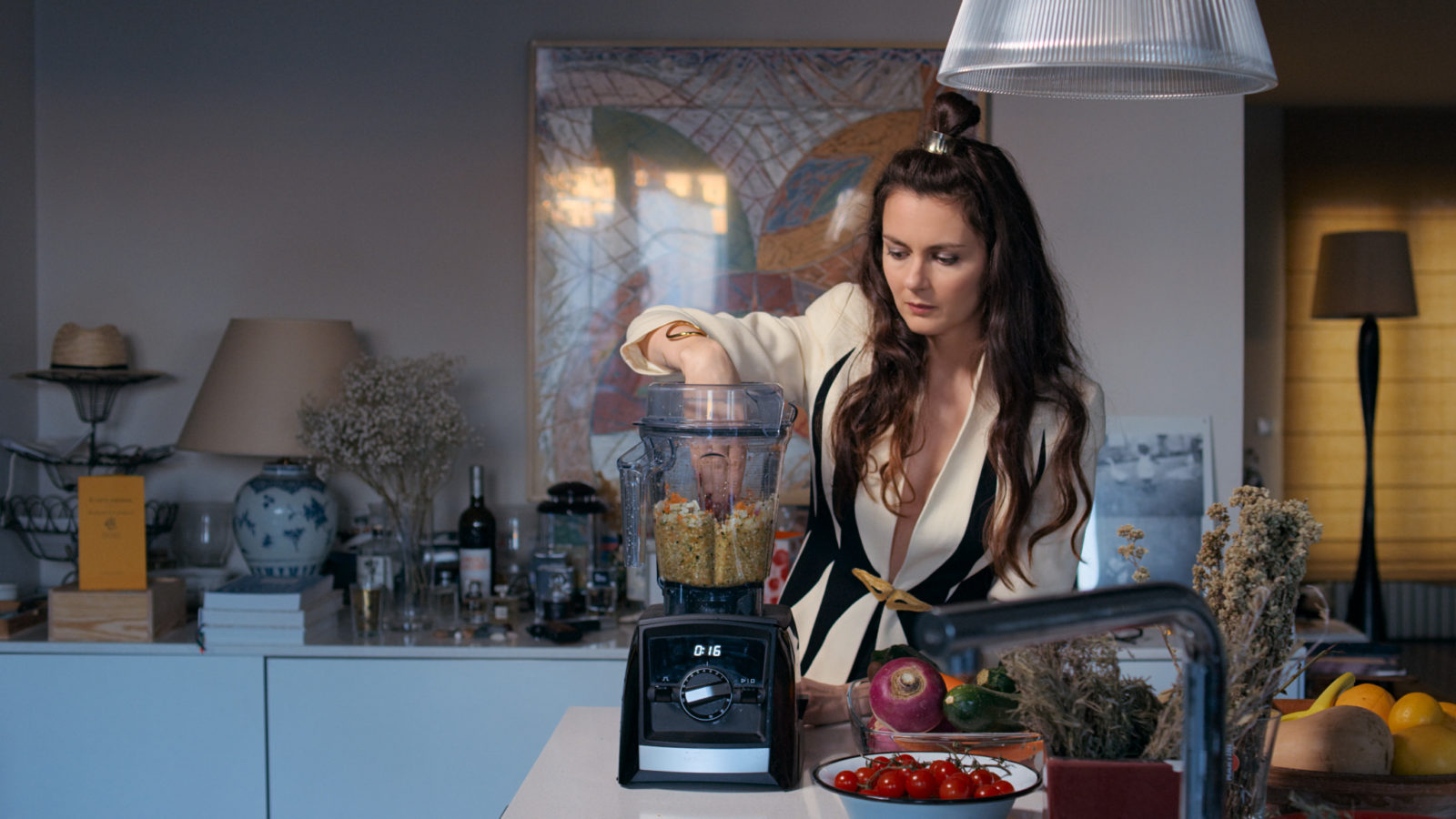It makes sense that the NYFF selection committee relegated “Coma” to Currents, despite Bertrand Bonello being a main slate kind of an act for the most part. On the one hand, it’s a movie that mostly takes place in its heroine’s (Louise Labeque, back from “Zombi Child”) bedroom, as she imagines dramatic scenes in her dollhouse and watches deranged YouTube videos. On the other it’s a Covid movie where Covid is the impetus and subtext and unlike in, say Claire Denis’ pantingly horny “Stars at Noon” (main slate), not just texture. “Coma” may not have precisely the ambition of the Denis, but it does feel bigger than the bedroom in which it transpires. Bonello never just does anything.
Labeque’s teenager is holed up by herself in her little corner of a fairly large French household riding out Covid-19 with little but her phone and laptop for company (her parents never appear, though her tiptoed excursions to the main part of the house suggest their judgmental presence just the same). She watches a chipper online personality (Julia Faure), who gives the film its name. Labeque has the rising urge to self-mutilate, and when Faure reminds her that she can’t fit her hand into a food processor, she creeps down to the kitchen to make sure. She FaceTimes her friends, who spend their spare time ranking the famous serial murderers until one of them seems to be killed by one of them. The interruption almost doesn’t faze them, so normalized is the idea of true crime to the bored kids. In her daydreams, sometimes she’s an animated character, still trapped, though. The funniest, and most touching, distraction she gives herself is when she makes her toys come to live to perform for her. In sequences that suggest Bonello’s a fan of this TikTok, her dolls play out a drama of infidelity. At first, they don’t move, and the subtitles and voiceover tell us they’re alive, but later Bonello makes them stop motion. Shockingly, one of the dolls is voiced by Gaspard Ulliel.
Ulliel was Bonello’s “Saint Laurent” in his so-named 2014 biopic, giving an enigmatic, sexily sinister performance. Ulliel died early in 2022 in a skiing accident. He was only 37, an impossible tragedy and a loss for a cinema that will miss his feline features and purred deliveries, his beautifully scarred face, his unknowable eyes. It’s nice that one of his last performances was so playful and for one of his best directors (Marvel, unfortunately, got their hooks into him for an episode of the risible “Moon Knight,” which aired earlier this year) and even nicer that he got to play up a deadpan comedic side. Opposite the other doll voices (Anaïs Demoustier and Louis Garrel among them), he plays the troublemaking cheat who’s stepping out on his doll wife. When confronted with his deceit, he responds with Donald Trump quotes, apparently oblivious to his partner’s question. “Coma” is about what it’s like to survive with only your cellphone as a lifeline; you understand why Labeque tapes her hand to the counter and contemplates running a kitchen knife through it. The film starts out looking like it’ll be minor Bonello, but it gets heavy in a hurry. Of all the provocateurs of the French cinema (and boy they’ve got plenty), Bonello seems to really love his people, even though he can be cruel to them. Like the best post-punk artists, he sings the worst of our suffering so we might reflect on it and feel less alone.

“Queens of the Qing Dynasty” is also a song of abject loneliness. Director Ashley Mckenzie is staking out territory in a new Canadian independent landscape (unlike peers Sofia Bohdanowicz, Deragh Campbell, and Kazik Radwanski) as a showstopping Neo-realist. Her 2016 debut feature “Werewolf” made a quiet splash with its heartfelt study of two drug addicts trying and failing to live on the outskirts of polite society. “Queens” is evidently based partly on teens who came in to audition for “Werewolf,” whom McKenzie befriended. Sarah Walker plays Star, an unstable teen with a history of suicide attempts who is a regular at her local hospital. She’s getting too old to stay in the hospital as long as she’s used to, and the staff are trying to get her used to fending for herself, though she’s unfit for traditional work. Placement in a local motel is short-lived after she smokes pot in her room and has old friends over for a loud party. Her only port in the storm that is her life is An (Ziyin Zheng), the carer the hospital assigns to Star while she’s staying. An gives Star a cellphone so they can text and so that An can keep better track of her. An is depressed too, but for different reasons, including anxiety over a green card. Star, recognizing that she might try to harm herself less if her situation was more stable, suggest the pair get married, which is close to the only lucid idea we see her put together in the movie.
“Queens” is a much more deliberate work than “Werewolf,” and at two hours it’s able to sink deeper into its characterizations and ideas. Walker’s performance of McKenzie’s writing is a wonder. Every sentence she utters has the same grammatical construction, hinting at the many ways in which the world is a peculiar binary for Star. Star’s marriage proposals and the ways in which she tries to make sense of what’s in front of her (“Are we flirtin’” is practically her mantra in social interactions) are heart-breaking, because there’s both pragmatism and optimism in them. Her usual disposition is misery, a desperate search for sensation or destruction, whichever arrives first. An, whose inner life we get even more of a window into than Star’s, represents a break from the usual for the lost young woman. Though Star can’t fully make sense of An’s sexuality or wants, she does know that An is gentle with her and honest in a way the rest of her care givers aren’t. “Queens” stares at Star the way Star stares at the world, with a searching focus, with confusion, sure, but patience and empathy. “You’re good at giving compliments,” says one nurse to Star while undergoing an evaluation after a suicide attempt; she seems to defuse the tension of her enervating actions by telling people they have nice eyes or they dress well. “Queens” pays its twin heroes compliment after compliment, praising their resilience, their compassion, their honesty, all without losing sight of just how hard it is for them to live.
Elsewhere in the Currents line-up are further statements from the frontlines of the crisis of living. Elisabeth Subrin’s “Maria Schneider 1983” recreates an interview with the great actress three times to illustrate that our love of rubbing people’s noses in their trauma hasn’t abetted in the intervening decades. Sarah Friedland’s great “Trust Exercises,” the final film in her trio of shorts about movement as it relates to life in the 21st century, is about the way corporations and grifter capitalists have hijacked the language of holistic health and wellness. Friedland’s observations about the falseness of workplace “safety” and the commodification of therapy speak are subtle, but what’s loud and clear is how little anyone is likely to feel like themselves anymore. How do you feel safe in your own body anymore, let alone when it’s placed in groups of people you don’t know? After two and a half years of Covid, with mass shootings every other week, what does it mean to feel safe anymore period?

Mark Jenkins’ main slate feature “Enys Men” asks the same questions but by looking into the past, not the present. Jenkins’ M.O. is based in antiquity, from his expert use of 16mm film (the light leaks and jittery grain are manna from heaven) to his fixations on generational occupations. “Bait,” his 2019 breakthrough focused on a fisherman in a village losing its identity to tourists. “Enys Men” is about a lighthouse keeper fleeing her past on an island only visited every few weeks. If you left Robert Eggers’ “The Lighthouse” feeling a little bereft of emotional interest as I did, “Enys Men” is the movie to watch, which is a little funny because it’s even more opaque.
Mary Woodvine is the lonely lighthouse keeper, the sole inhabitant of an island off the Cornish coast … or is she? The place is flooded with ghosts, both from her past and from the island’s. Jenkins attacks the idea of the forgotten coming back to haunt the present with raw forcefulness and unyielding surrealist energy. Woodvine, clad in the red coat from “Don’t Look Now,” is like a magnet for the island’s dead. Miners, nuns, her own lovers and children, all and sundry come out to play as she stares in mute horror as she does at her own life and the people she let down, in various, maybe bloody ways. “Enys Men” recalls the two great Clark(e)s of British TV, Alan and Lawrence Gordon, who brought folk horror to the small screen in the ‘70s. Abstract, melancholy, gorgeous, spare, and even with its influences proudly stitched on its sleeve, original, “Enys Men” is more experimental than mainstream cinema is frequently allowed to be. If it breaks through, it’ll be a win for the medium. Jenkins is one of the most exciting directors out there, and by putting him in the main slate the New York Film Festival co-signs. In a festival line-up replete with legends, “Enys Men” seems a sign that Jenkins is on his way to becoming one.












